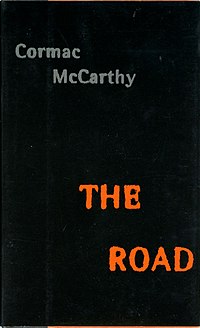
The Road (click on the title to watch the trailer of the film) is a 2006 novel by American writer Cormac McCarthy. It is a post-apocalyptic tale of a journey taken by a father and his young son over a period of several months, across a landscape blasted by an unnamed cataclysm that destroyed all civilization and, apparently, almost all life on earth. The novel was awarded the 2007 Pulitzer Prize for Fiction and the James Tait Black Memorial Prize for Fiction in 2006.
Because of falling ash, the setting is very cold and dark and the land is devoid of living vegetation. There is frequent rain or snow, and electrical storms are common. Nearly all of the few human survivors are cannibalistic tribalists and/or nomads, scavenging the detritus of city and country alike for human flesh, though that too is almost entirely depleted. Their presence is noted by their leavings, mutilated and/or decorated skulls.
Overwhelmed by this desperate and apparently hopeless situation, the boy's mother, pregnant with him at the time of the cataclysm, commits suicide some time before the story begins; the rationality and calmness of her act being her last "great gift" to the man and the boy. The father coughs blood every morning and knows he is dying, yet he struggles to protect his son from the constant threats of attack, exposure, and starvation, as well as from what he sees as the boy's innocently well-meaning, but dangerous desire to help wanderers they meet. Through much of the story, the pistol they carry, meant for protection or suicide if necessary, has only one bullet. The boy has been told to use it on himself if capture is imminent, to spare himself the horror of death at the hands of the cannibals.
In the face of these obstacles, the man and the boy have only each other (they are "each the other's world entire"). The man maintains the pretense, and the boy holds on to the real faith, that there is a core of ethics left somewhere in humanity. They repeatedly assure one another that they are "the good guys," who are "carrying the fire."
On their journey, the duo scrounge for food, encounter roving bands of cannibals, and contend with casual horrors such as a new born infant being roasted on a spit, and people being kept captive as they are slowly harvested for food. Although the vast majority of the book is written in the third person, with references to "the father" and "the son" or to "the man" and "the boy," at one paragraph only in the discussion of the journey the story is told in the first person.
Although the man and the boy eventually reach the sea, neither the climate nor availability of food has improved. Despite having succeeded in defending the boy through extreme hardship, the man has failed to find the salvation he had hoped for his son, and succumbs to his illness and dies; leaving the boy alone, though he is told that he may continue to speak to the father and that the father would still be present. Three days later, however, the grieving boy encounters a man who has been tracking the father and son. This man, who has a wife and two children of his own, brings the boy to join his family. One of the children is a girl. A brief epilogue meditates on nature and infinity in this altered environment.

1 comment:
Post a Comment